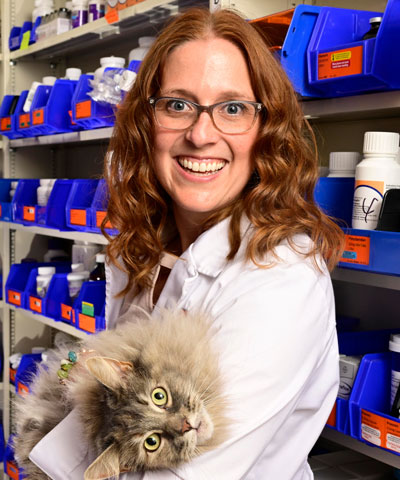
Introduction
Dr. Lauren Forsythe is an Assistant Professor at the University of Findlay College of Pharmacy and a diplomat at the International College of Veterinary Pharmacists. She earned her PharmD from Findlay, completed a veterinary pharmacy residency at Purdue, and served as a clinical pharmacist at UC Davis and the University of Illinois. Dr. Forsythe co-authored Drug Compounding for Veterinary Professionals and consults through Foresight Pharma Solutions. She also holds an MBA from the University of Illinois. Learn more about her here.
Why Pharmacy
My parents were both veterinarians and I knew I didn't want to be a vet, but I liked the healthcare field. I had a friend that I showed horses with who was a pharmacist, and I decided that being a community pharmacist sounded like a good career.
Career Journey
Halfway through pharmacy school my compounding pharmacy professor asked if I had considered veterinary pharmacy. I didn't even know that existed, so once I found out, I decided that would be a perfect fit for me. I completed my veterinary pharmacy residency at Purdue's Veterinary Teaching Hospital as their first vet pharmacy resident (1 of 4 in the country that year). I then spent 3 years as a clinical veterinary pharmacist at the UC Davis Vet Med Teaching Hospital. After that I was the pharmacy service head and a clinical assistant professor at the University of Illinois College of Veterinary Medicine for 4 years. When I graduated from pharmacy school, I said that my dream career was to run a pharmacy at a veterinary teaching hospital, and that's exactly what I did for my four years at Illinois. During that time, I learned that I loved process management and budget/financial considerations leading to me getting my MBA from UofI. However, I also learned that I really don't like managing people which running a pharmacy required an awful lot of. I also really enjoyed teaching veterinary students and the occasional pharmacy student while at these vet schools, but that wasn't my primary role. When family needs made me consider a job with a better work-life balance and closer to family, Findlay (my alma mater) was looking for a new SAS professor. SAS isn't my specific area, but I had gained an appreciation for the topics through my MBA and saw the application in pharmacy practice. I also really enjoyed regulatory considerations, so I requested to teach law in addition to Pharmacoeconomics. I also get to teach a vet pharmacy elective and maintain my consulting business where I help veterinarians in private practice with their pharmacy-related needs such as controlled substance management and compounding.
Current Role and Responsibilities
My current academic position is really flexible. For me that's a blessing because I like having a lot of autonomy with when and where I work best. However, I know that can be a struggle for people that do better with a more structured environment. My typical week consists of teaching in a didactic setting, planning for upcoming class sessions, grading exams and assignments, meeting with students, committee work for the college and university, research, and writing. I also spend a small amount of time doing consulting work as my "clinical practice". How much of those I do on any given day varies, but I incorporate all of those aspects into each week.
Challenges
Knowing when to say "no" since there is no shortage of things to be involved with in academia. I got where I am by taking advantage of a lot of opportunities (not always clearly related to my current role) and doing more than necessary. However, I eventually reached the point of burnout which forced me to at least acknowledge the need to get better at saying 'no' to some opportunities, or at least saying 'not right now'. That's still a challenge for me because I can see the benefits to my personal and/or professional growth from pretty much anything I'm asked to do, and I am a people- pleaser and want to help out.
Rewards
I love the challenge of taking a topic that many people find complex and breaking it down into small pieces that make sense for students. I think that's why I really like teaching Pharmacoeconomics and controlled substances. It's so rewarding to get creative, try out my plan and then see the lightbulb go of for a student when suddenly what seemed so complicated and overwhelming suddenly makes sense.
Advice for Students and Aspiring Professionals
Take advantage of opportunities and pay attention to the aspects of what you are doing that you really like. I definitely didn't take a straight, well-planned path to get where I am, but I ended up here doing a very specific subset of pharmacy that I really like because I followed my interests.